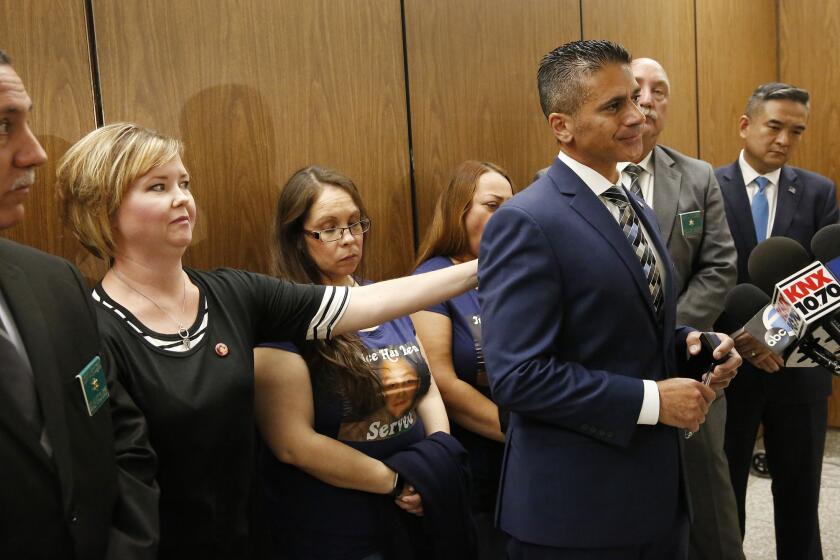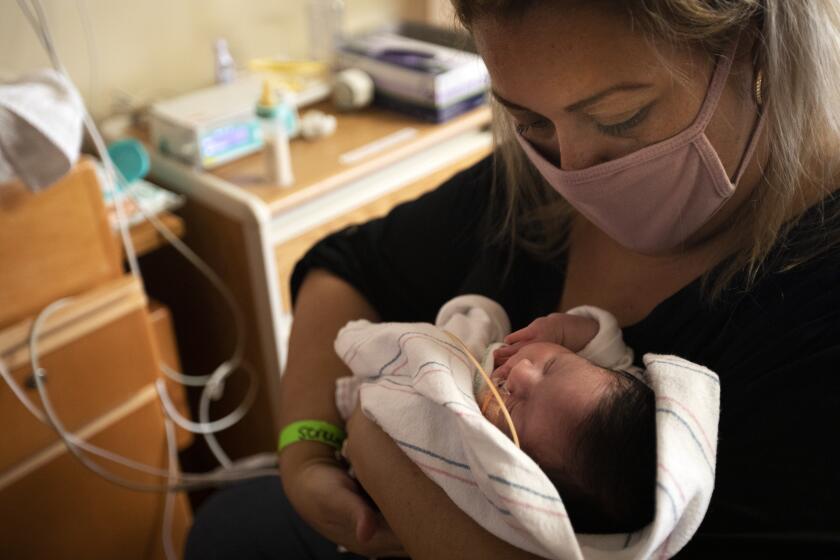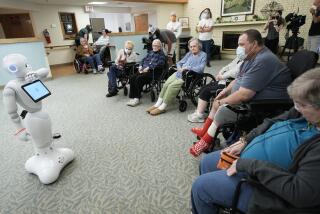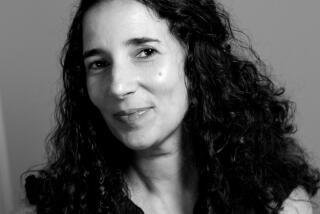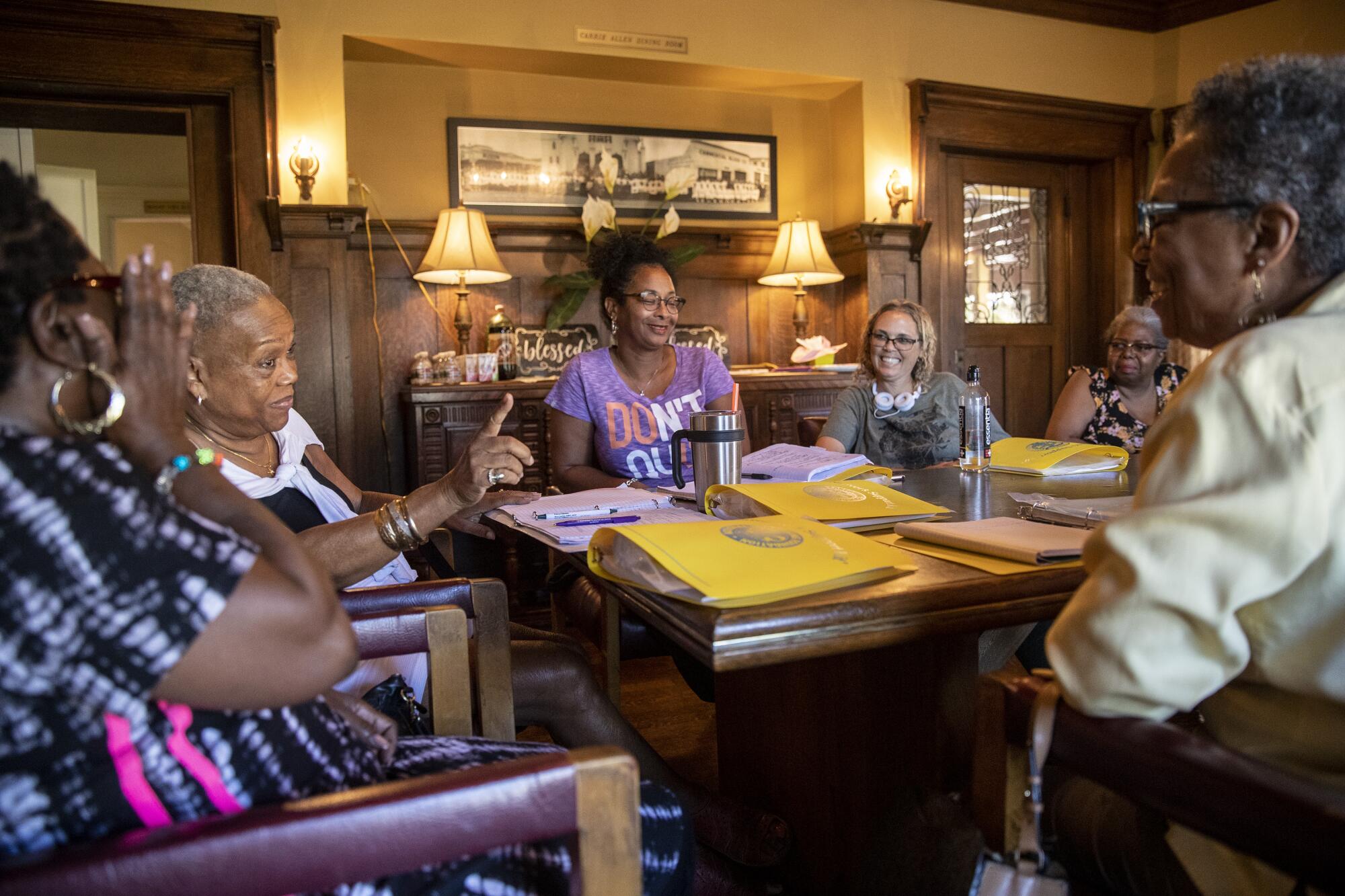
- Share via
Her hands pulsed with pain as she tried, once more, to tug a pair of super-tight socks over her husband’s toes and up his swollen legs. The compression socks would help his circulation, she reminded herself. They would help keep him out of the hospital.
Helen Wynne — the full-time caregiver for her husband — took a deep breath and yanked. But a twinge crawled up her fingers and reverberated in her joints, a feeling she knew well after years of living with lupus and arthritis.
She sat on the floor of her South L.A. home crying and looking up at her frail, then-89-year-old husband, Harel, a Korean War veteran, who leaned down to help but couldn’t reach his feet.
“I can’t do it!” Wynne remembers crying out.
It was around that time last fall — during the days of back-to-back ER visits, when she started to feel lightheaded from stress — that the 67-year-old Wynne decided to follow up about the pamphlet she’d picked up during a recent church event. On a Tuesday morning a year ago, she arrived at the support group for caregivers that, before the pandemic, met twice a month at the First African Methodist Episcopal Church.
I’m Helen, she told the group, and I’m a caregiver for my husband, who has Alzheimer’s. When I have to remind him to eat or nap, she told the women around the wooden table, I feel like I’m caring for a child again.
The group’s leader, Bobbe Akalonu, offered an encouraging nod.
“Welcome to the caregiver world,” she said.
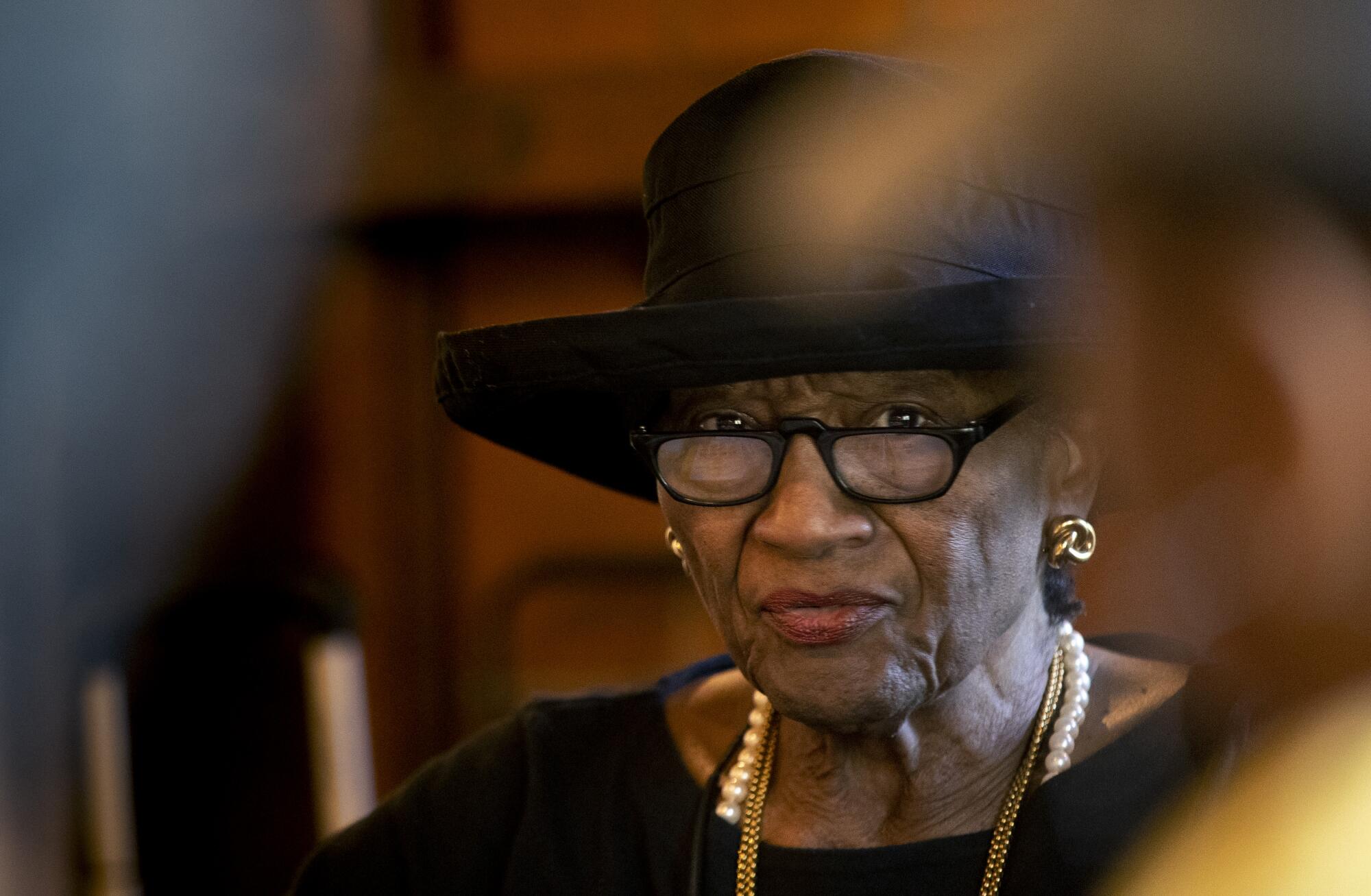
The dynamic Akalonu, 86, who wears a signature black hat and reminds you, with a smile, that she’s “vintage, not old,” leads the support group that now meets via conference call.
Akalonu started the group in 2014 as a collaboration between First AME, the city’s oldest African American church, and USC’s Family Caregiver Support Center, one of 11 state-funded caregiver resource centers, which she learned about years earlier while caring for her mother, who had vascular dementia.
She is passionate about inclusivity — any caregiver is welcome, Akalonu often says — but the core group of current attendees are all women, many of whom have some tie to the church in the West Adams district. Akalonu has attended the church since she was a baby.
The group members are predominantly baby boomers caring for husbands or parents with dementia or Parkinson’s, but there is also a millennial in the group and members of the Silent Generation (born from 1928-1945), as well as a “sandwiched caregiver,” who helps her mother who has Alzheimer’s and her son who has Down syndrome.
During Wynne’s first meeting, her cadence quickened as she introduced herself and began rattling off her husband’s many health conditions. She paused, scanning the room until she locked eyes with Akalonu.
“I’m listening,” Akalonu assured her. “I hear you.”
The stress had been crushing lately, Wynne said, and she realized she’d neglected herself and her own health.
“Self-love first,” Akalonu said.
During the 90-minute meetings, the women grieve for their old lives — about the days before they had to remind their mother of their name or stare into their sister’s eyes and see only blankness. They talk about how hard it is to make big money decisions without input from a partner.
While sharing stories about how, after a seventh call, you sometimes have a breakthrough with the insurance company, they toss out terms like “Coumadin” and “laminectomy,” knowing that everyone here understands the reference to a blood thinner and back surgery.
Inside this room, the isolation they often feel finally disappears.
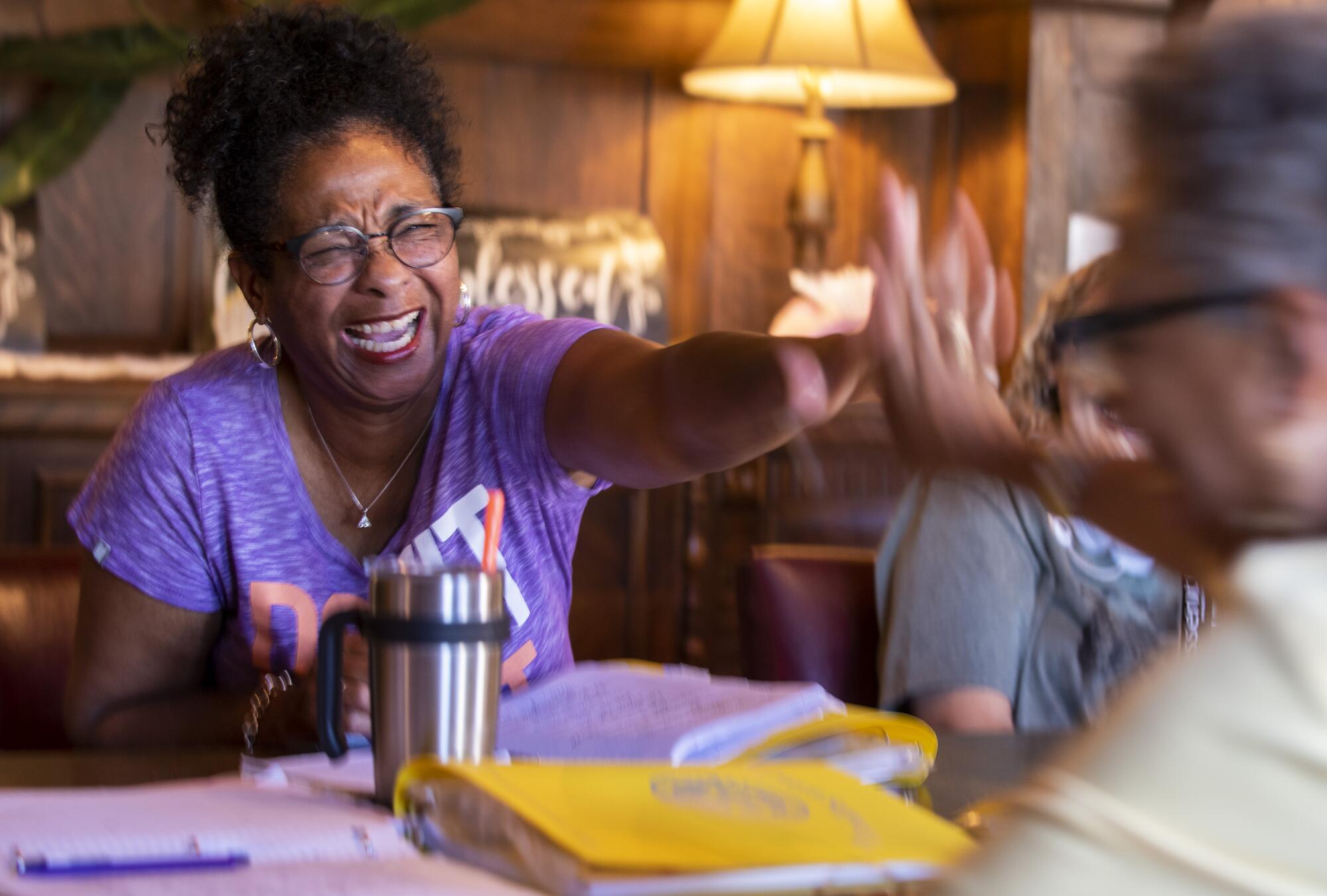
::
The U.S. is several years into a caregiving crisis that’s expected to get worse as the baby boomers age.
With divorce, couples having fewer children and people retiring later in life, the pool of caregivers within families is dwindling quickly. By 2030, AARP estimates, the ratio of Americans in their 80s or older to potential family caregivers will be 1 to 4, down from 1 to 7 a decade ago.
And that will be especially problematic in California, which is graying rapidly and faces a projected shortage of more than half a million professional home-care workers in the next decade — a problem born of the mismatch between low wages and the tiring work.
The growing shortfall of professional caregivers will put more pressure on the state’s 4.5 million family caregivers, including the women in the Tuesday support group.
And because older Black people are about twice as likely as older white people to have Alzheimer’s or other dementias, the growing gaps will continue to disproportionately affect Black families.
When a member of the Tuesday group mentioned her recent vacation and the steep price tag of her husband’s week-and-a-half-long stay at a respite care facility — $5,000 — it drew knowing nods from around the table. At another meeting, a longtime caregiver said she scrutinizes even the slightest changes in her husband’s condition, desperate to catch any issues before they require an ambulance ride.
“That’s $1,500,” another member added.
“Easily.”
The average family caregiver in California spends $7,000 out of pocket annually toward their loved one’s care. The financial strain is disproportionately high for Black caregivers — who on average spend more of their annual income on caring for a loved one than white caregivers — and who are more likely to care for a loved one without help from service providers, said Dr. Donna Benton, a geropsychologist who runs the Family Caregiver Support Center at USC.
And that is why the support group at First AME — a civic powerhouse and spiritual hub for many Black Angelenos — is so important. It provides a critical bridge, Benton said, for linking Black caregivers to the services offered by the USC center, including individual consultations, training and access to support groups and grant money for respite.
“They serve as that trusted middleman,” Benton said of the church, explaining that while some caregivers might feel hesitant coming to the university for help, they often feel more comfortable knowing it’s a partnership with First AME.
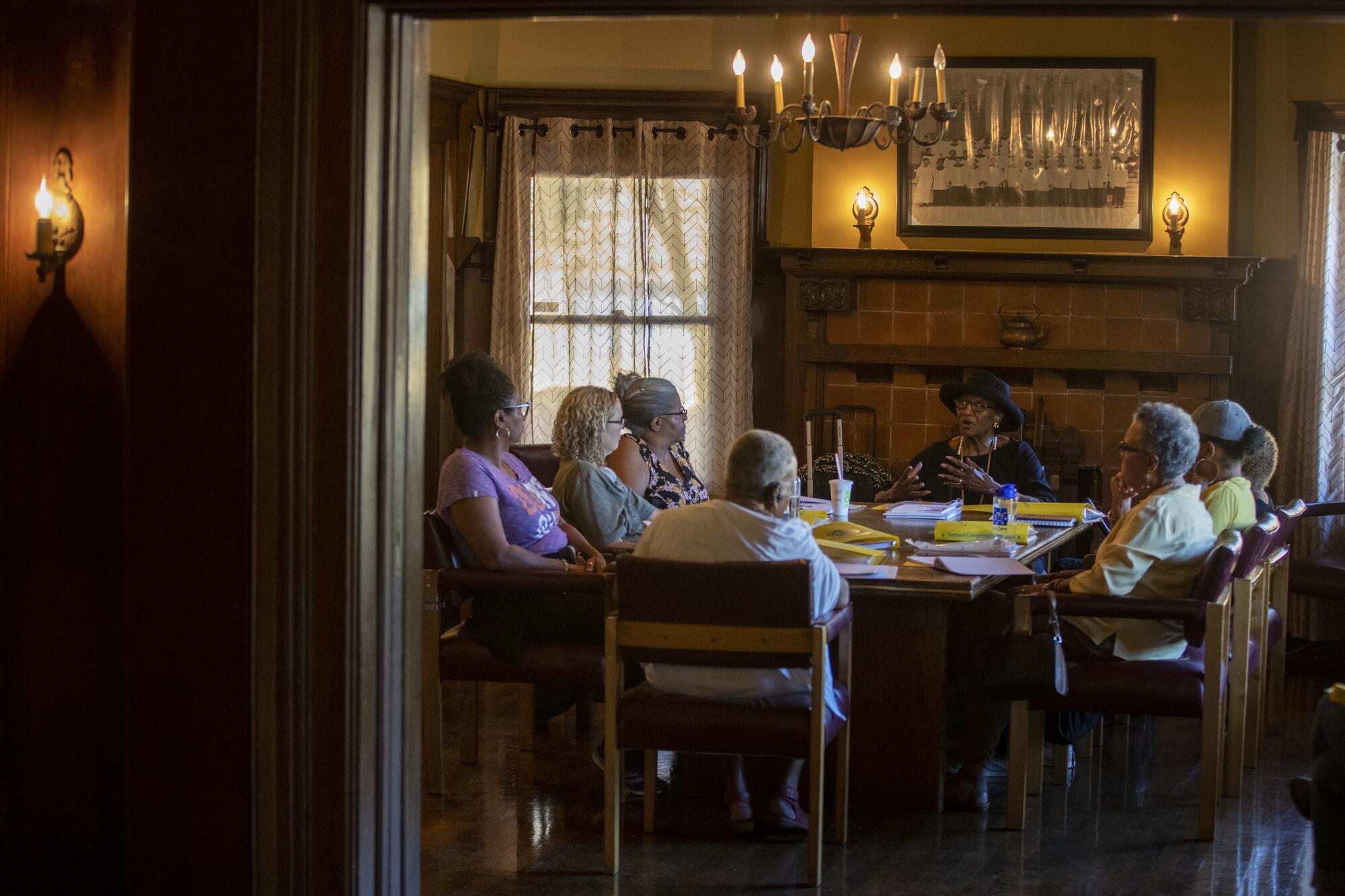
The collaboration has been so successful that other caregiver centers across the state are now partnering with AME churches in those areas.
The COVID-19 pandemic has not only shone a bright light on disparities within the healthcare structure in the U.S. It has also helped highlight other areas of inequality, including the dire effects of not having proper technology or Wi-Fi as more doctor’s appointments and support groups have moved online. The center recently has helped some caregivers get new computer tablets, Benton said, but there is still a vast need.
While a 2018 report from California’s family caregiver task force concluded that the state’s current policies haven’t “kept pace with changing needs,” the topic of family caregiving has gained serious traction in recent years.
Edna Kane Williams, senior vice president for multicultural leadership at AARP, who was a live-in caregiver for her mother for six years, described the role as “an all-consuming, exhausting, emotional roller coaster.” While she was caring for her mother, her social circle shrunk drastically and quickly — she often felt isolated, trapped and hesitant to ask for help.
“I never did a support group and I’m really sorry that I didn’t,” she said. “I think there’s strength in sharing your story.”
And while support groups are an important piece of the puzzle, Kane Williams said, they’re still rare in many parts of the country and they can’t solve all the stressors caregivers face, including the long-term financial effects, especially for people — often women — who put their careers on hold.
“There definitely is a price people pay,” Kane Williams said, adding that the effects are even more pronounced for Black and Latina women, who already get paid less than anyone else for equal work.
“When is enough enough?”
::
It was 6:15 a.m. on a Thursday in February and Wynne had already been up for half an hour.
She scurried through the kitchen, twisted on the gas stove and threw a frozen turkey patty and eggs on the skillet. After setting the table, she put her husband’s blue pillbox to the right of his plate — eight tablets, including Donepezil, a memory medication that she says helps him remember to do things like turning off the faucet.
“Breakfast is ready!” she shouted from the kitchen. Harel walked slowly into the dining room, stopping a few feet shy of the table.
“You’re right here, baby,” she said, tapping twice on his chair. He took a few more steps, then paused, whispering the word “jacket.” She helped him pull on his green fleece and then guided him to the table.
Before the pandemic, her husband spent a few hours each week at the Mayfair Adult Day Healthcare Center. Now he stays home, and Wynne is helped by a caregiver whose costs are covered because Harel is a veteran.
Having someone come three times a week to help cook and clean was especially crucial, Wynne said, after she had foot surgery and had to stay off her feet. During those two weeks, she had a second caregiver, whom she found through the USC center, come to help her.
“An answer from God,” she said.
Moments after winning a murder conviction in the death of 8-year-old Gabriel Fernandez, the lead prosecutor, Jon Hatami, stunned the public with a revelation: He too had been abused as a boy.
While she hasn’t yet called into the Tuesday group since it’s gone virtual, she hopes to return soon, knowing it’s a space where members often chime in with advice or a gentle correction for one another.
A therapist whose husband has Parkinson’s worries about him falling when he gets up to use the restroom at night. (“Would a bedside commode help?”) Another woman complained of insomnia. (“Try the Hallmark Channel. ‘Golden Girls’ at 2 a.m. works like a charm.”)
A new member said she wanted to take a trip to Atlanta, but wondered whether anyone had put their loved one in a respite-care facility for more than a week. (“Yes, for a trip I took to Malta.”) Did you feel any guilt? (“I’ve learned not to.”) Another member vented that her mother has turned into quite the “mean girl.” (“It’s the disease, not the person.”)
When Akalonu, the group’s leader, was growing up, her paternal grandmother got sick and moved into a small bungalow behind her family’s home near USC.
“We always took care of our elders,” she said, explaining that following the deaths of her husband and father in the early 1980s, her mother had a vascular stroke and Akalonu moved into her home so she wouldn’t be alone. For years, her mother maintained a lot of independence, but when her dementia worsened, Akalonu turned to the Family Caregiver Support Center for help.
Her mother died in 2002, but her passion for caregiving remained and she wrote a proposal for the support group and presented it to Pastor J. Edgar Boyd, who loved the idea of collaborating with USC, knowing it holds sway in statewide conversations about caregiving, aging and research surrounding Alzheimer’s. Boyd was also particularly impressed with the USC center’s focus on respite.
“Caregiving is a godsend, and having somebody relieve the caregiver is even more of a godsend,” Boyd said.
During an in-person meeting before the pandemic, Akalonu asked Melissa Phillips — “our millennial,” Akalonu lovingly calls her — how she was doing. Phillips, now 38, said she was deeply frustrated with herself. She had forgotten to remind her 89-year-old grandmother, whom she lives with, not to take her blood thinner before a dental appointment, so her grandmother couldn’t have a tooth pulled as planned.
“Are you taking blame for those things,” Akalonu asked, “when you should be forgiving yourself?”
Phillips smiled softly.
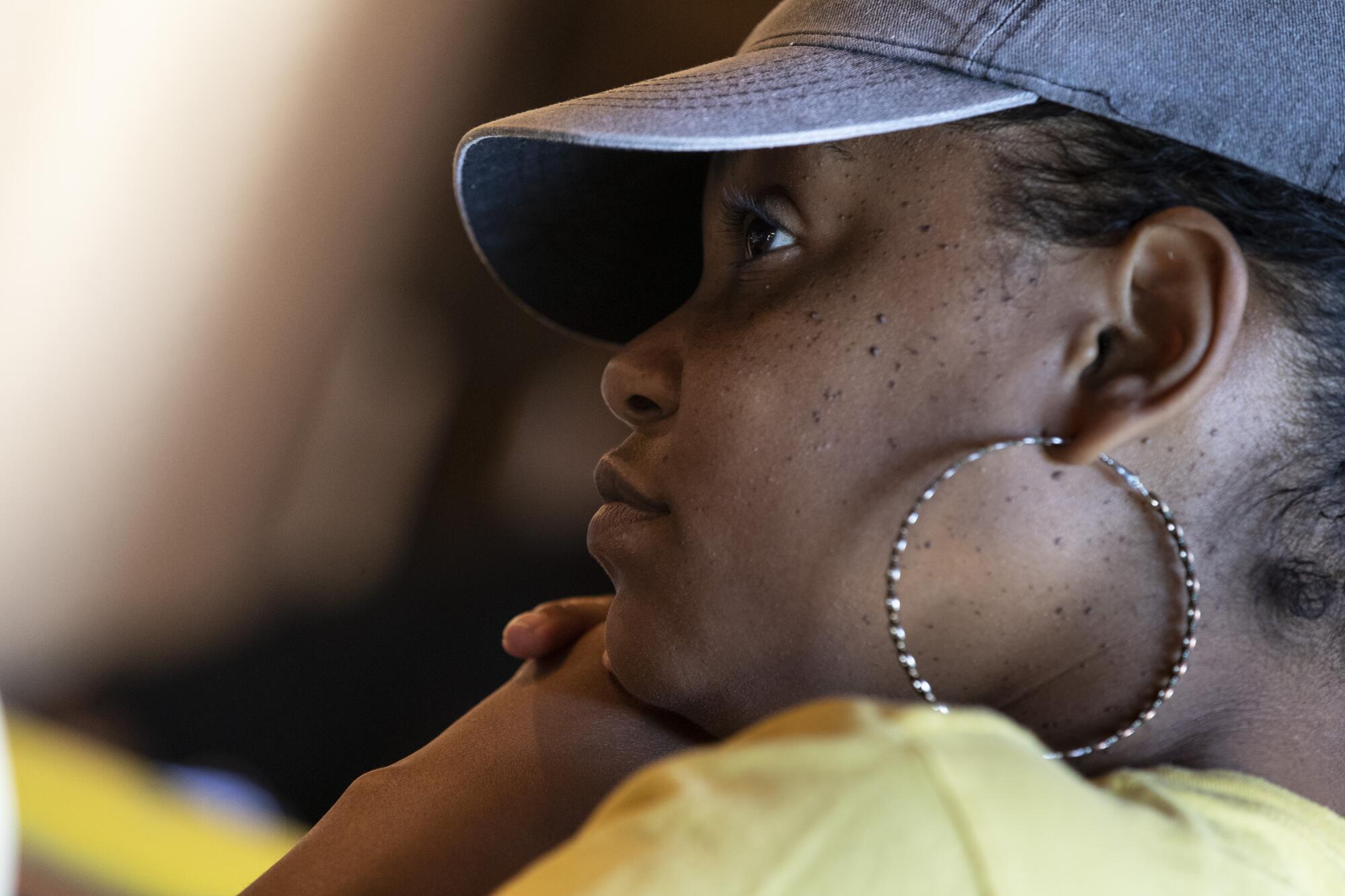
Phillips adores Akalonu — “Miss Bobbe,”she calls her — for her warm, sure presence. As a small thank-you to her and the other group members, she bought them folding fans from the Dollar Tree. They gasped and hugged her, as if she’d given them Tiffany diamonds.
“To be around that type of gratitude,” Phillips said. “It does something to you.”
The pandemic has made keeping a routine — a sacrosanct part of caregiving — especially tough.
Before the shutdowns, Phillips’ grandmother maintained a robust social life. She went to several church events and salsa and line dancing classes every week. Then, in an instant, it was gone.
Phillips encourages her grandmother to take Zoom dance classes, but it isn’t the same. She still has her cheerful spirit, Phillips said, but now walks more slowly, seems deeply tired and often repeats the same question 50 times in a day.
“I saw it rapidly affect my granny,” Phillips said.
Very little is known about the impact of COVID-19 on women and the babies they carry.
These days, during their Tuesday meetings, the women share about the latest visiting restrictions at hospitals or nursing homes. They swap information about rent-relief grants and free food delivery services for seniors and encourage one another to practice self-care with at-home Zumba or a drive to the ocean.
In her 86 years, Akalonu told the group, she could not recall anything like this moment in history. The pandemic has created deep stress, she said, but has also served as a reminder of how interconnected we all are.
“It’s gotten us out of ourselves and into other people.”
At the end of the meeting, women signed off, creating a melody of “Buh bye,” “Have a peaceful evening, “and “Be blessed,” layered over a steady electric beep of ending calls. “Until we meet again,” one last voice said before the line went quiet.
They knew that in two weeks, they would all dial in again to share new setbacks and joys — another chance to laugh together through tears.
More to Read
Sign up for Essential California
The most important California stories and recommendations in your inbox every morning.
You may occasionally receive promotional content from the Los Angeles Times.
